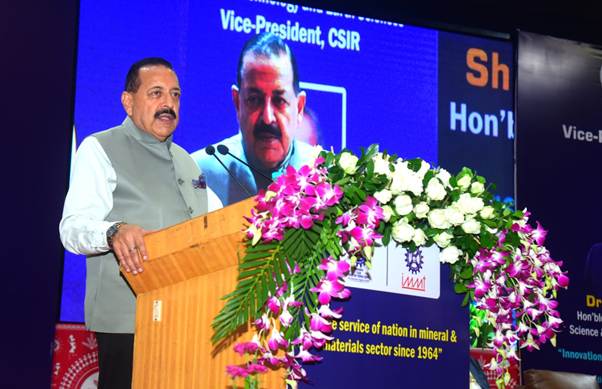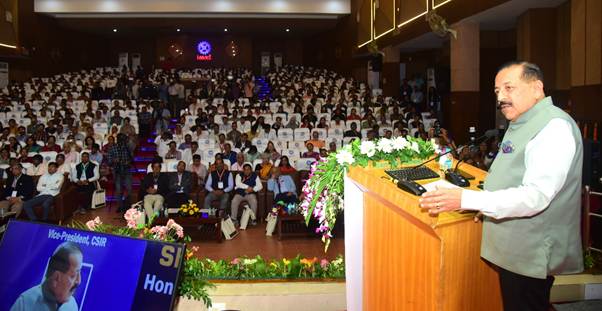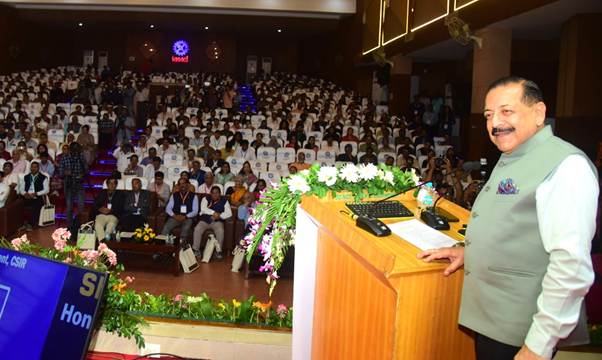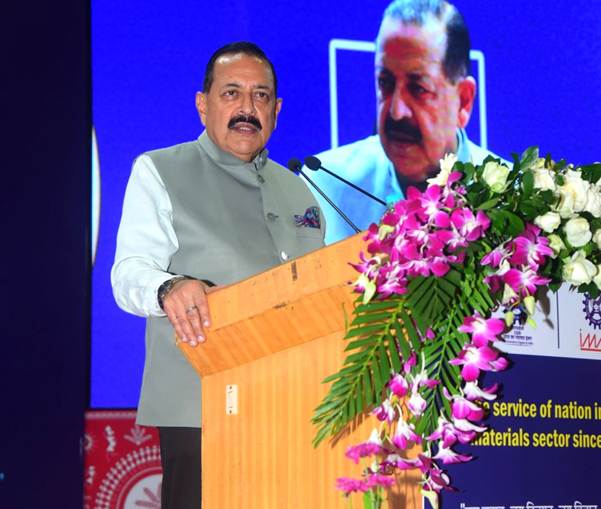On the eve of World Diabetes Day, Union Minister Dr Jitendra Singh launches “Phenome National Conclave on Longitudinal Cohort Studies: Cohort Connect 2025”, at CSIR–IMMT, Bhubaneswar
On the eve of World Diabetes Day, Union Minister Dr Jitendra Singh launches “Phenome National Conclave on Longitudinal Cohort Studies: Cohort Connect 2025”, at CSIR–IMMT, Bhubaneswar
On the eve of World Diabetes Day tomorrow, Union Minister of State (Independent Charge) for Science & Technology, MoS PMO, Personnel, Public Grievances, Pensions, Atomic Energy and Space, Dr Jitendra Singh today launched “Phenome National Conclave on Longitudinal Cohort Studies: Cohort Connect 2025”, at CSIR–IMMT, here.
Cohort Connect is said to be India’s largest evidence-based study on Genetic, Lifestyle and Environmental drivers of Disease.
Delivering the inaugural address, Dr. Jitendra Singh said that the discussion taking place a day before World Diabetes Day carries special relevance, as metabolic disorders like diabetes are rapidly emerging as a major national health challenge. He emphasised that diabetes today represents not just a clinical condition but a complete spectrum of vascular, neurological, and renal complications, making scientific research in this domain critical for national planning.
On the eve of World Diabetes Day, Dr. Jitendra Singh said that India’s fight against diabetes and other rising metabolic disorders requires Indian data for Indian solutions, supported by long-term scientific evidence.
The Minister recalled that metabolic disorders, especially Type-2 diabetes, once considered region-specific, have now spread across the country due to lifestyle transitions and changing environmental patterns, turning what was earlier a South India–predominant condition into a pan-India challenge. He emphasized that India continues to deal simultaneously with both communicable and non-communicable diseases, and the reciprocal link between diabetes and infections such as tuberculosis requires integrated policy responses rather than compartmentalised programmes.
Dr. Jitendra Singh underscored that India’s phenotypic uniqueness has been acknowledged for decades, but could never be scientifically validated due to limited genomic and epidemiological infrastructure. With initiatives like CSIR-led Phenome India and the large-scale longitudinal cohort studies being undertaken, India now can accurately capture how genetics, environment, diet, and lifestyle shape disease predisposition in Indian populations.
The Minister noted that even Indians living abroad for generations show distinctive susceptibility to metabolic disorders, highlighting the fundamental role of inherited traits.
The Minister shared clinical and historical insights illustrating how global medical understanding has evolved- from pre-insulin starvation-era diabetes management to today’s genetic therapies, and urged caution in adopting new drugs and technologies without long-term evidence suited to Indian populations. He recalled that refined oils were once promoted as heart-friendly, only to be later linked with rising coronary artery disease in India, reinforcing the need for rigorous, long-term, India-specific studies before public health recommendations are made.
Highlighting Government initiatives, Dr. Jitendra Singh said that both CSIR and the Department of Biotechnology are working actively on human genome sequencing, with nearly 10,000 human genomes already sequenced and the target of one million genomes progressing rapidly. He also mentioned India’s first successful haemophilia trial with indigenously developed Factor VIII, underscoring India’s rising capabilities in advanced biomedical research.
Dr Jitendra Singh added that the Government is simultaneously working on vaccines for diseases like dengue, malaria, and tuberculosis, while AI-driven diagnostics, digital health platforms and quantum-enabled solutions are increasingly becoming part of India’s medical ecosystem.
The Minister reiterated that with 70% of India’s population below 40, prevention must be the central pillar of India’s future health strategy. A robust cohort study ecosystem, he said, will generate actionable datasets for preventive, prophylactic and therapeutic pathways tailored to Indian needs. He appreciated CSIR institutions, project investigators, and private-sector partners for creating a platform that integrates science, evidence creation, and translational application through MoUs and venture collaborations.
Dr. Jitendra Singh concluded by stating that India’s health status in 2047 will define the vision of Viksit Bharat, and scientific initiatives like Phenome India and Cohort Connect 2025 would serve as foundational pillars in achieving that goal. Citing Hippocrates, he said that even without tools or medicines, a doctor’s knowledge can heal; similarly, India’s collective scientific wisdom will drive its health transformation in the coming decades.
The inaugural session was attended by Dr. Ramanuj Narayan, Director, CSIR–IMMT, Dr. Maiti (CSIR–IGIB), Dr.Kooti, Dr. Debashish, senior scientists, project investigators, and media representatives. They briefed the press on the objectives and emerging insights from the Phenome India longitudinal cohort, along with the agenda of the upcoming National Conclave on Longitudinal Cohort Studies: Cohort Connect 2025, scheduled to be held at CSIR–IMMT, Bhubaneswar.



